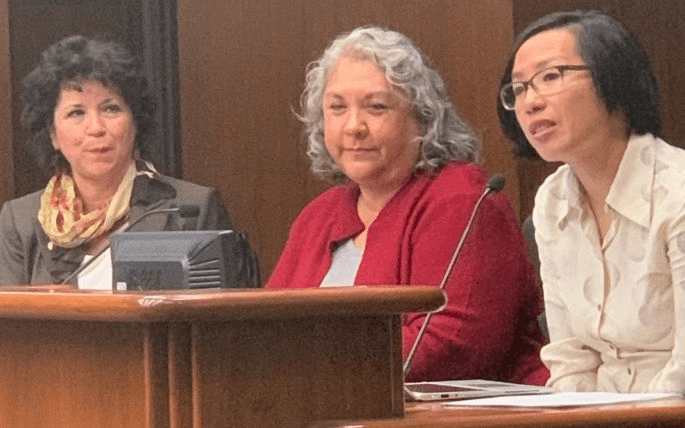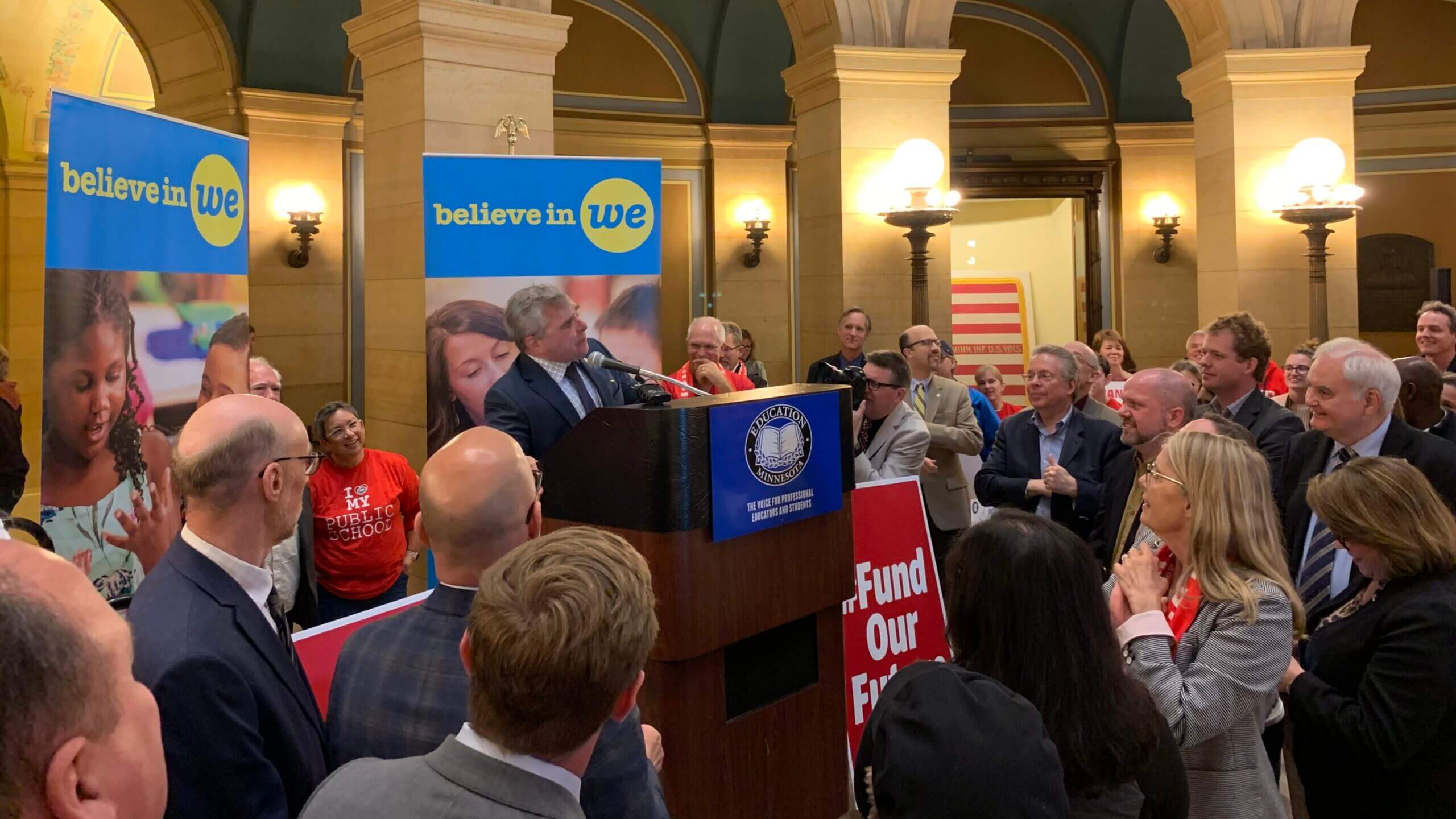The 2022 election flipped the Minnesota Senate to a pro-public education majority. With that, Senate leadership went back to a two committee structure for K-12 education—one focusing on education finance and one on education policy. Leading those two committees as chairs are two retired educators and Education Minnesota members. Sen. Mary Kunesh, a 25-year library media specialist in her second term in the Senate after also serving in the House, is chair of the Senate Education Finance Committee, and Sen. Steve Cwodzinksi, a 33-year social studies teacher starting his third Senate term, is chair of the Senate Education Policy Committee.
Why is having educators as education committee chairs important? The committee’s chair has the primary agenda-setting authority for the committee. The chair identifies the bills or issues on which the committee will try to formally act through hearings and vote to continue on to become law. Having people who know what it is like to be an educator making those decisions means they know what to prioritize to get students, educators and schools what they need.
The Minnesota Educator sent Sen. Kunesh and Sen. Cwodzinksi a few questions so Education Minnesota members can get to know them and what to expect from their leadership this session.
Minnesota Educator: Why did you run for office?

Sen. Kunesh: Over my 25 years as a teacher—a Library Media Specialist for 20 of them—I experienced many changes; some good, some not so much. Sometimes change was good but come every fall, we’d gather as a staff and hear the outcome of legislative mandates. Quite often mandates were decided by persons with little understanding of the reality of the world of learning by students and instruction by teachers. Too often mandates came unfunded, compromising the entire structure of school districts. As an LMS I worked with all teachers and I heard their frustration and discouragement, motivating me to make a difference. Then came my first volunteer opportunity to work on a big campaign and having met movers and shakers I learned how the political world worked. I knew that I could do it, so I waited, learned more, met more folks, and when the opportunity arrived, I jumped at the chance to move Minnesota in the right direction!

Sen. Cwodzinski: Throughout my tenure as a civics teacher, I used three overarching values to teach the crucial role American citizens play in our government, civic duty, civic virtue, and political efficacy. During these years, I had many students ask why, if I preached these principles, I didn’t run for office myself. And, for just as many years, I wouldn’t have a response. When I was set to retire after 33 years of teaching, I decided I wanted to put into practice what I tried to teach my students. And by running for the Minnesota State Senate, that’s what I tried, and am trying, to do.
Minnesota Educator: Who was your favorite teacher?
Sen. Kunesh: My favorite teacher was a nun named Sister Del Rey. I went to a small village parochial school that was right behind my house. Sister Del Rey was very creative and artistic, and I loved her creativity. She planned fun art projects, encouraged me to use my creativity, and let me spend time together after school to help her. She was kind to a kid who often got lost in a big family, making me feel unique and talented. She was chatty, but not too much, let me help run the mimeograph (those papers smelled so good!), and was probably my first adult friend. When she left to go to another school, I remember feeling like I lost my best friend.
Sen. Cwodzinski: When remembering my own time in education, two teachers stick out to me. First, Mr. Baker instilled in me a sense of knowledge for current events and following what is happening around the world. Secondly, Mrs. Salverson introduced me to the world of fiction and instilled a love of literature.
Minnesota Educator: What does it mean to you to be chairing a committee on education?
Sen. Kunesh: I am still a bit disbelieving! To think that six years ago I was a middle school teacher who was responsible for establishing a well-rounded library collection, teaching technology, researching and resources, administering standardized testing, grumbling about the Legislature, and now—I’m in the role of making financial decisions that will affect 2,014 Minnesota schools and 821,260 students! It is a daunting responsibility but one I am excited and ready to take on. Minnesota is in a unique position of where three of the four education chairs are former educators—and the fourth a huge student advocate. With those life experiences, we are ready to both identify and understand the individual needs of the students in Minnesota and then utilize keen insight into how we will advocate for students, staff, communities, and the specific needs that will allow our communities to thrive.
Sen. Cwodzinski: As an American government teacher, it’s a dream come true. In a culmination of 33 years in the classroom and six years on the education committee, I am honored to be the Chair of the Minnesota Senate Education Policy Committee. Now, I come to work every morning, sit at my desk, face the Minnesota State Capitol Building, and do my best to better the education system.
Minnesota Educator: What are some of your top priorities for education in Minnesota?
Sen. Kunesh: I am determined to ensure that educators have the resources that they need to create a positive, productive classroom to meet the needs of all students. That means that not only do classrooms have the technology and tools to assist instruction but also the support staff to address barriers to learning. I’m confident that when we put classrooms, mental health, special education, and English learning supports in the forefront; when we make sure every kid has access to free meals, incorporate creative instruction across the spectrum, and pay our staff a true living wage, our students and staff will succeed.
Sen. Cwodzinski: My top priorities for education in Minnesota include menstrual equity, civics and financial literacy education requirements, supplemental nutrition aid, improving the mental health of students, and teacher respect, recruitment and retention. During the height of COVID, I called my friends who are still teachers and asked how the school year was going. Let’s just say, I stopped asking how the year was and started asking what their silver lining after COVID would be. The resounding answer was to go back to educating the holistic child. One of the biggest aspects of our education system is that there is more to education than the academics. Physical, social and emotional growth are all crucial to preparing a student for life, not just college or a career. I like to say, “don’t let academics get in the way of your education.”
Minnesota Educator: How will you use your experience in education from your own life in your legislative work?
Sen. Kunesh: My 25 years in education and my own life experiences have greatly influenced my decision to run for public office. I have had many positive influences in my life; individuals who have mentored me, collaborated with me, provided constructive professional development, and encouraged me when exhaustion and struggles were affecting our ability to bring valuable instruction to diverse classrooms. Having witnessed firsthand the challenge of providing full funding to meet the needs of special education students and English Learners fueled my run for the Legislature. Personally feeding students who could not pay for lunches and seeing valuable resources—like Library Media Specialists—be eliminated, all brought me to this unique responsibility in bringing systemic changes to our students and teachers. These experiences have fueled my desire to help shape young minds, and it hasn’t changed—I’m just working from a new, unique angle.
Sen. Cwodzinski: I have spent more time in the classroom and have taught more students than any other senator in Minnesota history. This experience granted me a unique perspective on education issues and prepared me to take on the role of Education Policy Chair. Being an educator also taught me the importance of maintaining nonpartisan relationships. I started every semester by having the conservative students in my class sit on one side of the classroom, and the liberal students on the other. Then, they would spend the next nine weeks bridging the gap between them.
Minnesota Educator: Why should educators stay engaged with the Capitol?
Sen. Kunesh: Our legislators need to hear from educators who work with our youngest to oldest learners. The most important thing to know is how valuable it is to develop and deliver a message to elected officials to create realistic policy and allocate constructive funding. Being a constituent as well as an educator, you represent the concerns of constituents—in fact, educators are some of the most important people with whom legislators or staff will meet because of the many diverse relationships you have in your schools and communities. As decision makers we often have access to many facts and figures surrounding issues. When educators engage with legislators, your job is to make the issue relevant by telling personal stories that illustrate the issues you most care about or choose to advocate for. What you bring to the table are compelling stories about the impact of policy issues on people that legislators represent.
Sen. Cwodzinski: The voter turnout in Minnesota is already among the highest in the nation. For our educators, voter turnout should be at 100 percent. It is important to take an active and engaged role in school referendums, state Legislature elections, and school board elections because educators teach our students that their voices matter too.


